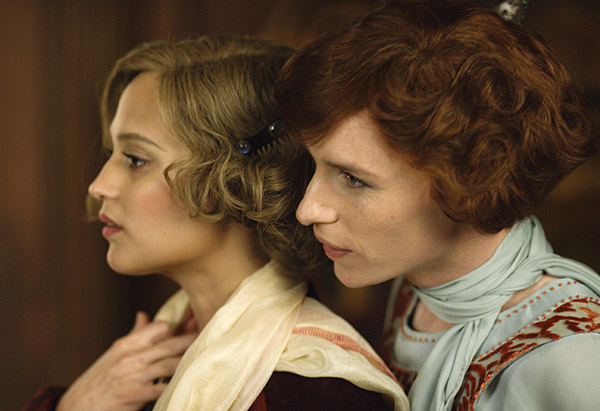Gilded Lily: The Danish Girl (review)
Eddie Redmayne is brilliant as trans pioneer Lili Elbe, but it's Alicia Vikander who truly shines in The Danish Girl

Fashioning the tale of transgender pioneer Lili Elbe into a mainstream-friendly love story may seem like shrewd packaging by a Hollywood marketing department, but the result is a film that succeeds above all else because that central love story is so well crafted.
David Ebershoff’s eponymous novel loosely depicted Elbe’s life, but The Danish Girl (![]()
![]()
![]()
![]() ) sticks closer to the facts. It follows Einar Wegener, a Danish painter, who slowly comes to realize that he is transgender after modelling women’s clothes for his wife, Gerda. From there, Lili is born, with the film following the couple as they navigate Lili’s exploration of her new gender identity and Gerda deals with her love for Lili and the loss of her husband.
) sticks closer to the facts. It follows Einar Wegener, a Danish painter, who slowly comes to realize that he is transgender after modelling women’s clothes for his wife, Gerda. From there, Lili is born, with the film following the couple as they navigate Lili’s exploration of her new gender identity and Gerda deals with her love for Lili and the loss of her husband.
If I’ve rushed my description of the film’s narrative, it’s because the film itself seems to consider the actual circumstances and plotlines of the story as unimportant. Tearing at breakneck speed through Lili’s transition, before reaching its conclusion at her pioneering gender reassignment surgeries, it bounces through the years of Lili and Gerda’s relationship without pausing to reflect, instead preferring to focus on the film’s two central performances.
As Lili, Eddie Redmayne is astonishing. A year after delivering an Oscar-winning performance as Stephen Hawking in Theory of Everything, he has produced another masterful transformation. His transition from meek, malleable Einar to radiant, confident Lili is stunning to behold. Redmayne’s study of transgender women reaps its rewards onscreen, in his hand movements, voice, posture, expressions. It helps that Redmayne himself is so utterly striking — androgynous enough to be handsome as Einar and beautiful as Lili. But it’s in the film’s quieter moments where he truly shines. When Lili first presents as a woman in public, at a ball with Gerda, she meets a man, Henrik (Ben Wishaw, wonderful as ever). As she wrestles with her emotions, she trembles, hands shaking, eyes darting, breathing quickened. Redmayne performs with such natural ease, melting so convincingly into the role, that any concerns of a cisgender man playing Elbe are quickly forgotten.
Arguably, though, The Danish Girl belongs to Alicia Vikander. As Gerda, she is the perfect counterpart to Redmayne. As Lili explores her newfound identity, it is Gerda’s reactions that will resonate more with the audience. Vikander ignores any urges to be overblown in her emotions, instead relying on her beautifully expressive eyes and subtle cues. Where other directors may have asked Vikander to cry more, or shout more, Tom Hooper revels in her restraint, which only adds extra weight to the moments when the emotion of losing Einar and dealing with Lili overcome Gerda. Vikander’s star hasn’t yet fully risen, but after her performance here it seems destined to be positively celestial.
Hooper has once again crafted a beautiful period piece. Anyone who has watched his output over the last few years will recognize his hallmarks — wide shots, off-center framing, sumptuous close-ups on eyes, lips, hands. If it seems paint-by-numbers, it’s only because Hooper has his craft so well-honed that he’s more than welcome to keep repeating it. One scene in particular, as Lili explores her body completely nude, is mesmerizingly captured — the framing, the direction of Eddie Redmayne, the synchronicity of the scene, makes it a shocking, emotional, revelatory experience.
The entire film has been crafted with the utmost care. Alexandre Desplat’s score, though occasionally overbearing, reminds us why he collected the Oscar last year, the costuming and hair and makeup departments have made the most of their presumably large budgets, and the supporting cast, including Matthias Schoenaerts as Einar’s childhood friend Hans and Amber Heard as Gerda’s friend Oola, are uniformly strong.
Of course, that only makes the film’s weaker points stand out more. The script, for the most part, is buoyed by the performances of the two leads, but includes some incredibly hokey lines. “You’re different from most girls,” Henrik tells Lili upon meeting her. Do we laugh at the obviousness of the statement? It also places most of the focus on Gerda — Lili is depicted as arrogant and selfish more than once — and though Lili’s transition is explored through Redmayne’s incredible body movements, it’s Vikander who reaps the best lines. There’s also the egregiously cheesy ending, which feels as though it was tacked on by a focus group that demanded a more obviously sentimental conclusion.
Still, The Danish Girl is a flattering, beautifully captured, captivatingly performed retelling of the marriage between a trans pioneer and her wife — and one sure to do well this awards season.
The Danish Girl opens Friday, December 11, at area theaters. For ticket information, visit fandango.com.
Support Metro Weekly’s Journalism
These are challenging times for news organizations. And yet it’s crucial we stay active and provide vital resources and information to both our local readers and the world. So won’t you please take a moment and consider supporting Metro Weekly with a membership? For as little as $5 a month, you can help ensure Metro Weekly magazine and MetroWeekly.com remain free, viable resources as we provide the best, most diverse, culturally-resonant LGBTQ coverage in both the D.C. region and around the world. Memberships come with exclusive perks and discounts, your own personal digital delivery of each week’s magazine (and an archive), access to our Member's Lounge when it launches this fall, and exclusive members-only items like Metro Weekly Membership Mugs and Tote Bags! Check out all our membership levels here and please join us today!

























You must be logged in to post a comment.